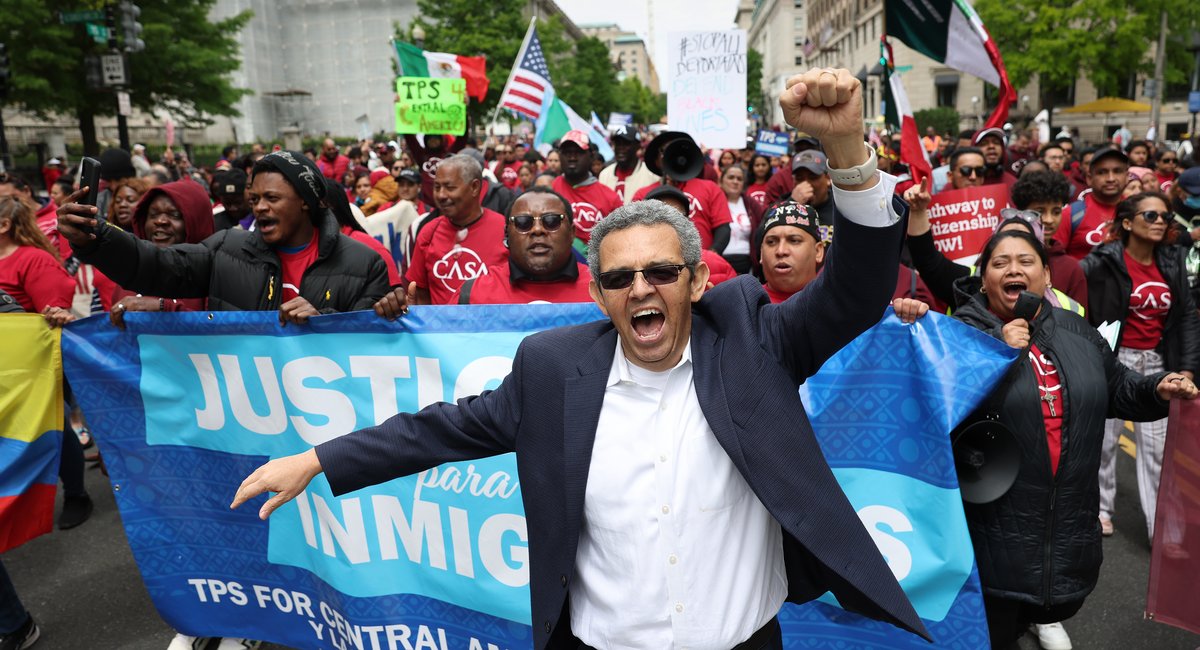The Biden administration’s announcement on Friday that it will end an immigration parole program that gave legal protections to migrants from four countries is expected to affect the lives of many New Yorkers, though exactly how many was unclear.
The lapse of the Cuban, Haitian, Nicaraguan and Venezuelan — or CHNV — parole program comes just weeks ahead of the Nov. 5 presidential election, in which border security and immigration have featured as central issues. The move is estimated to directly impact some 500,000 people nationwide, but could keep many more families separated.
Murad Awawdeh, president and CEO of the nonprofit New York Immigration Coalition, said in a statement that ending the program “will put the lives of as many as 530,000 people at risk.”
“By not extending their parole, President Biden is turning his back on individuals who have become a fabric of their communities — working, paying taxes and contributing to the country’s economy,” he said. “Without parole extensions, these individuals will face the reality of losing their legal ability to work, unable to support themselves or their families.”
A spokesperson for the U.S. Citizenship and Immigration Services confirmed the end of the program, which was implemented two years ago, and said it was intended to be temporary from the outset.
Republican members of the House Homeland Security Committee in August wrote to Homeland Security Secretary Alejandro Mayorkas that “a Department investigation recently revealed large amounts of fraud among applications for prospective sponsors in the CHNV program.” The controversy prompted the House GOP to tweet, “Shut it down permanently.”
Neither Rep. Andrew Garbarino nor Rep. Anthony D’Esposito — both of whom are Republicans on the House Homeland Security Committee and represent Long Island — immediately responded to questions about the program’s planned lapse.
Stephen Yale-Loehr, a professor of immigration law practice at Cornell Law School, said the CHNV parole program was established in part “to try to relieve some pressure on the U.S.-Mexico border.”
“So the people would be coming legally if they could have a financial sponsor in the United States, rather than illegally and tak[ing] their chances, risking that dangerous journey,” he said. “But it is temporary and it has worked to reduce the number of illegal entries at the border.”
Yale-Loehr noted that other factors could have affected the decision to end the program, including reports that the Venezuelan economy is improving.
The U.S. Department of Homeland Security has pointed to the measure’s success. In July 2024, U.S. Border Patrol encounters with CHNV nationals between official ports of entry were down 98% compared to December 2022, before the parole processes for these nationalities were fully implemented, according to a statement DHS posted on its website.
The House Homeland Security Committee’s August letter cited allegations that many parole applicants had attempted to game the system. DHS’ internal investigation, according to the letter, found that 100 physical addresses were listed for parole sponsors on unique application forms, with each address appearing between 124 and 739 times each, across more than 19,000 forms..
The committee letter continued, “The internal investigation also purportedly reveals that 2,839 sponsor forms contained non-existent zip codes and 4,590 forms were filled out with Alien file numbers that had never been issued by U.S. Citizenship and Immigration Services.”
Additionally, the committee letter noted, 100,948 forms had been filled out by “3,218 serial sponsors (sponsors who appeared on 20 or more forms).”
Dara Lind, a senior fellow at the nonprofit American Immigration Council, said various things can go wrong with a parole program. “And so it would not be surprising if one of the unintended consequences here were a greater extent of fraud than we’re used to seeing, which is usually very, very, very, very low,” Lind said.
She added that it was not possible to know if the program was ended for political reasons. “Unfortunately, the government has been really, really not transparent about this,” Lind said, noting “there was no communication” from the Biden administration about whether it would renew the program.
